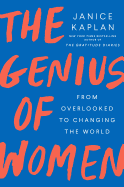
When asked to name a genius, more than 90% of Americans identify someone who is male--Albert Einstein, for example. Women are often an afterthought, with Marie Curie typically the only female luminary mentioned. In The Genius of Women, Janice Kaplan (The Gratitude Diaries) succeeds in correcting this misconception.
Reaching back into history, Kaplan highlights women whose notable achievements in their respective disciplines were forgotten, ignored or intentionally attributed to men. Among them are Einstein's wife, Mileva Marić, a stellar mathematician and physicist in her own right. Felix Mendelssohn's older sister Fanny likely wrote many of her brother's compositions. Rosalind Franklin was instrumental to the discovery of DNA, despite James Watson and Francis Crick receiving credit.
With fascinating insight and wit, Kaplan delves into cultural factors contributing to the bewildering yet common belief that brilliance is a characteristic reserved for men. Citing the importance of positive portrayals of female genius in pop culture, Kaplan points to neuroscientist Amy Farrah Fowler of The Big Bang Theory--played by Mayim Bialik, who earned a real-life Ph.D. in neuroscience from UCLA. ("They must have figured I could correct any science mistakes that the writers made," Bialik joked to Kaplan.)
Kaplan interviews numerous women who are blazing trails in various fields, motivated in part by their commitment to nurture and champion the next generation of leaders and visionaries. "Only if you can ignore the implicit restrictions and climb high are you then in the position to use your distinctive position for good. All of the women... walked through closed doors--and once they were on the other side, they looked for ways to push them wide open." --Melissa Firman, writer, editor and blogger at melissafirman.com

